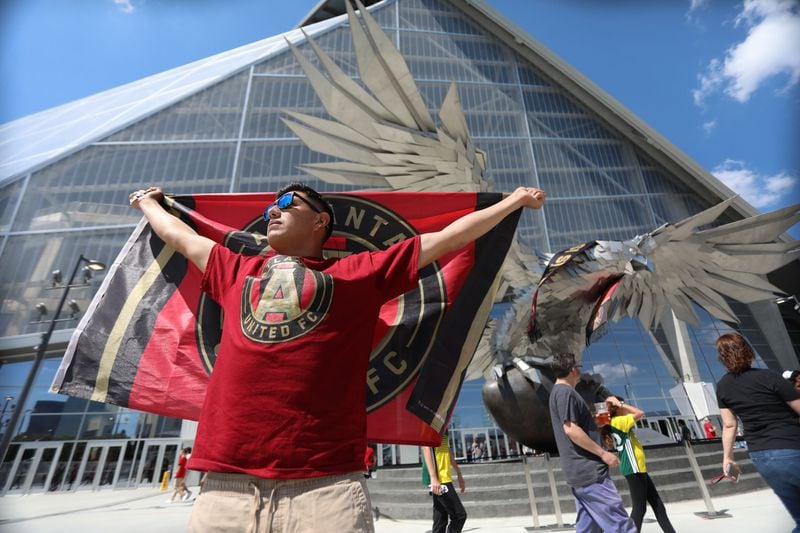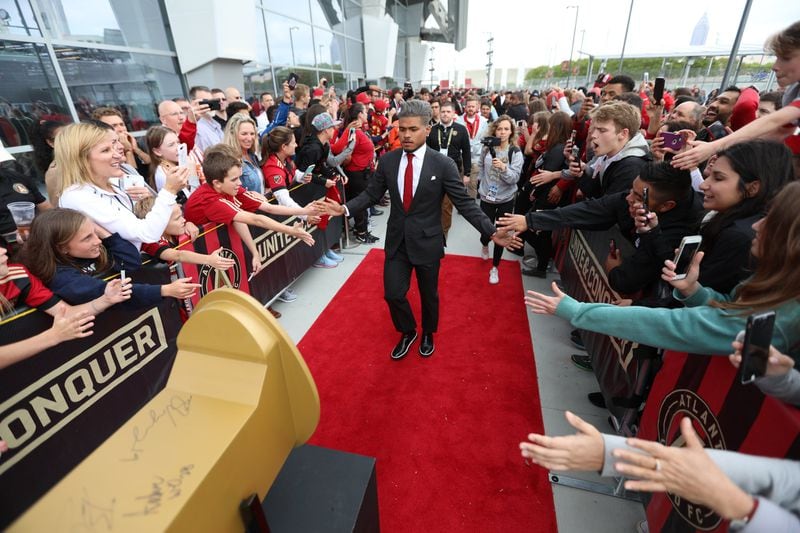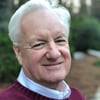Last week’s SEC Championship football game is an annual contest downtown Atlanta’s hotels and restaurants count on each year, and they hope February’s Super Bowl LIII will bring an even bigger boost.
But Saturday’s MLS Cup at Mercedes-Benz Stadium between Atlanta United and the Portland Timbers is the surprise soccer title match business leaders hope will bring an unexpected financial windfall, with more than 70,000 fans expected downtown.
Mike Jakob foresees a thirsty crowd. Jakob owns Elliott Street Deli & Pub in the shadow of the stadium, and the bar is gearing up for a day-long party with live music and what Jakob described as a “victory” celebration after the match.
The United has drawn an MLS-leading 53,002 per match this season. Nine times the United have drawn 70,000-plus over the past two years.
“It’s an amazing thing for our city,” Jakob said, noting that Saturday will be the 22nd United home match this season.
George McKerrow, CEO of Ted’s Montana Grill, which has its flagship location on Luckie Street near Centennial Olympic Park, said the match should increase business 10 percent to 20 percent over the four days starting Thursday. He said the MLS title match will help make up for diminished enthusiasm for the Falcons, who are mired in a losing season.
“The city is on fire with the Super Bowl and other things coming our way, and 2019 is going to be a banner year,” he said, calling the MLS Cup “the icing on the cake and the marshmallow on the hot chocolate.”
Karen Bremer, CEO of the Georgia Restaurant Association, said United tickets tend to be at lower prices than for other marquee events, meaning fans should have more discretionary money in their pockets.
“My expectation is a lot more money will be spent this weekend than had been expected,” she said.
Mark Vaughan, executive vice president and chief sales officer of the Atlanta Convention & Visitors Bureau, said the United contribute an estimated 1,500 to 2,000 new hotel room nights for each match during the regular season, a number likely to grow for the nighttime title game.
For instance, MLS, the teams and media have reserved 2,300 room-nights this week, up from the 150 room nights reserved for the league, teams and media for a regular season game. That figure does not include rooms reserved by fans.
The MLS Cup crowd will be dominated by locals, meaning hotels won’t fill like they would for a Super Bowl. But The Oregonian newspaper reported this week that the MLS has allotted a record 1,700 tickets to the visiting Timbers for this year’s match.
Landing big events
Mercedes-Benz Stadium opened in August 2017. When the stadium deal was being negotiated, Atlanta sports and tourism officials touted the impact it would have in helping lure big events to the city.
Sports economists are generally dubious of public financing packages for stadiums, saying the public benefits seldom live up to the public costs — which in the case of Mercedes-Benz Stadium amounted to $200 million in bonds up front toward construction, and likely more than $700 million in overall public costs over 30 years.
But the stadium has at least lived up to its big game promise, landing the college football national championship game in January 2018, Super Bowl LIII and the NCAA Men’s Final Four in April 2020.
The college events might well have come to Atlanta without a new stadium, because college athletics officials generally remained big fans of the Georgia Dome until the end. But the NFL had made it known Atlanta, which last hosted a Super Bowl in 2000, would not get another one without a new stadium. And Atlanta United was brought into existence by owner Arthur Blank’s organization in conjunction with the building of the stadium.
“We’ve been really fortunate … that our calendar has been front-loaded with so many big events,” said Steve Cannon, CEO of the Falcons and Atlanta United parent company AMB Group, which also operates the stadium.
The MLS Cup is different than the other events. It wasn’t awarded to the stadium through a long-term contract (as with the SEC Championship games) or through bid processes (as with the college football national championship game, the Super Bowl and the Final Four).
Instead, it had to be earned on the field by Atlanta United.
Hungry for a winner
Saturday’s match won’t draw anywhere near the national TV audience of a Super Bowl or SEC title game, but it will make up for that in local emotional value if the home team wins.
“Even bigger than the monetary impact is the spiritual uplift of the community,” said A.J. Robinson, CEO of downtown business alliance Central Atlanta Progress. “Atlantans are long-suffering fans. The last championship we had was 1995.”
That title, of course, was the World Series won by the Braves. It was followed by a massive victory parade down Peachtree Street that brought hundreds of thousands downtown.
"I'm hopeful we'll have a parade, but we've got to win the game first," Robinson said.
For more than two decades, Atlanta has been gripped in a championship drought. The Falcons have been to two Super Bowls but failed to win. The Hawks haven't reached the NBA Finals since moving to Atlanta. The Braves haven't won even one playoff series in 17 years.
United’s success comes as the Falcons have struggled in their new building. The Falcons have a middling 8-7 record in regular-season games there, including 3-4 at home this season.
In fact, many boosters hoped the Falcons would be the first NFL team to play in a Super Bowl held in its home stadium, but with a 4-8 record, prognostication site FiveThirtyEight gives the team a measly 1 percent chance of even making the playoffs.
In just its second year of existence, the United have outdrawn the Hawks and Braves on a per-game basis, with a rabid fan base that's shown futbol can even compete in the South with American football. This summer, the United even outdrew some matches in international soccer's marquee event, the World Cup, which held some matches in smaller stadiums in Russia.
“There’s been an unbelievable amount of great decisions made from the way the team was put tougher, to the way it was marketed, to the way the stadium was constructed, to the fan clubs and the merchandise,” Robinson said. “A lot of good decisions were made, and we’re all benefiting from it.”
HOW ATLANTA TEAMS DRAW
Average attendance per game and full-season total attendance for Atlanta teams in their most recent full regular seasons:
Team/ Avg. per game/ Season total
Falcons: 71,960 / 575,681
United: 53,002 / 901,033
Braves: 31,553 / 2,555,781
Hawks: 14,409 / 590,769
(Note: Atlanta United and Braves figures are for 2018 regular season. Falcons figures are for 2017 season and Hawks for 2017-18 season.)
ATLANTA UNITED’S TOP CROWDS
Atlanta United has drawn the nine largest announced crowds in MLS history to Mercedes-Benz Stadium:
72,243 vs. Seattle on July 15, 2018
72,035 vs. D.C. United on March 11, 2018
72,017 vs. Real Salt Lake on Sept. 22, 2018
71,932 vs. Orlando City on June 30, 2018
71,874 vs. Toronto on Oct. 22, 2017
71,812 vs. Chicago on Oct. 21, 2018
70,526 vs. NYCFC on Nov. 11, 2018
70,425 vs. Orlando City on Sept. 16, 2017
70,016 vs. New York Red Bulls on Nov. 25, 2018
(Note: Announced attendance represents tickets distributed.)
Eyes on Mercedes-Benz Stadium
168 million-plus
The number of television viewers in the U.S. who have watched events held in the stadium since it opened in 2017.
100 million-plus
TV viewers in the U.S. expected to watch Super Bowl LIII on Feb. 3.
28.4 million
TV viewers in the U.S. who watched the College Football Playoff national championship game in January between Alabama and Georgia.
17.5 million
TV viewers in the U.S. who watched last week’s SEC Championship game between Alabama and Georgia.
3.8 million
Total in-person attendees to events at Mercedes-Benz Stadium since it opened.
2.95 million
The average TV viewership in the U.S. and Canada for the past two MLS Cup finals.
(Sources: AJC research, TV networks, AMB Group, MLS)









